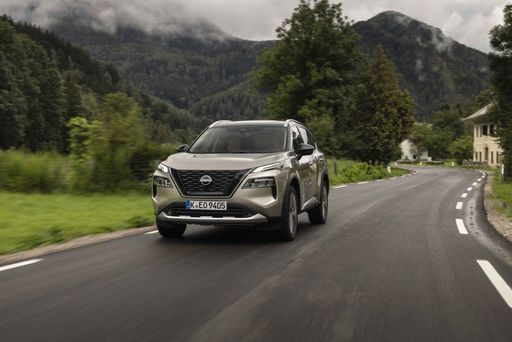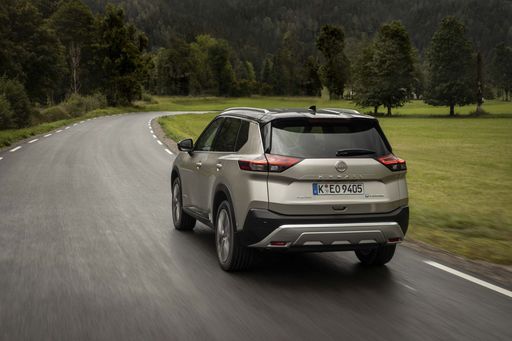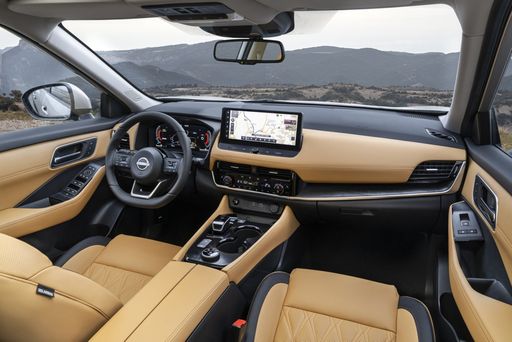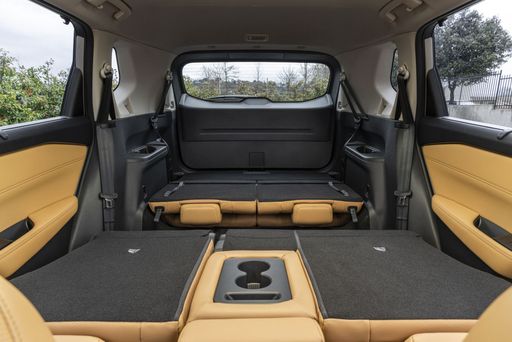Nissan X-Trail vs Toyota Yaris Cross - Differences and prices compared
Costs and Efficiency:
When it comes to price and running costs, the biggest differences usually appear. This is often where you see which car fits your budget better in the long run.
Toyota Yaris Cross has a significantly advantage in terms of price – it starts at 23700 £, while the Nissan X-Trail costs 34000 £. That’s a price difference of around 10337 £.
Fuel consumption also shows a difference: Toyota Yaris Cross manages with 4.50 L and is therefore noticeable more efficient than the Nissan X-Trail with 5.70 L. The difference is about 1.20 L per 100 km.
Engine and Performance:
Power, torque and acceleration are the classic benchmarks for car enthusiasts – and here, some clear differences start to show.
When it comes to engine power, the Nissan X-Trail has a distinct edge – offering 213 HP compared to 130 HP. That’s roughly 83 HP more horsepower.
In acceleration from 0 to 100 km/h, the Nissan X-Trail is decisively quicker – completing the sprint in 7 s, while the Toyota Yaris Cross takes 10.70 s. That’s about 3.70 s faster.
In terms of top speed, the Nissan X-Trail performs a bit better – reaching 200 km/h, while the Toyota Yaris Cross tops out at 170 km/h. The difference is around 30 km/h.
Space and Everyday Use:
Cabin size, boot volume and payload all play a role in everyday practicality. Here, comfort and flexibility make the difference.
Seats: Nissan X-Trail offers distinct more seating capacity – 7 vs 5.
In curb weight, Toyota Yaris Cross is clearly lighter – 1180 kg compared to 1668 kg. The difference is around 488 kg.
In terms of boot space, the Nissan X-Trail offers clearly perceptible more room – 585 L compared to 397 L. That’s a difference of about 188 L.
In maximum load capacity, the Nissan X-Trail performs evident better – up to 1424 L, which is about 327 L more than the Toyota Yaris Cross.
When it comes to payload, Nissan X-Trail to a small extent takes the win – 574 kg compared to 510 kg. That’s a difference of about 64 kg.
Who comes out on top?
Overall, the Nissan X-Trail shows itself to be wins the duel decisively and secures the title of DriveDuel Champion.
It convinces with the more balanced overall package and proves to be the more versatile choice for everyday use.
 @ Nissan Motor Corporation
@ Nissan Motor Corporation
Nissan X-Trail
Costs and Consumption
View detailed analysis
Engine and Performance
View detailed analysis
Dimensions and Body
View detailed analysis
Nissan X-Trail
The Nissan X-Trail is a roomy, no-nonsense family SUV that mixes sensible practicality with a quietly modern look, making it an easy choice for busy lives and weekend escapes. It drives with calm confidence, delivers a comfortable ride and sensible tech, and won’t demand drama while doing the everyday heavy lifting.
details @ Nissan Motor Corporation
@ Nissan Motor Corporation
 @ Nissan Motor Corporation
@ Nissan Motor Corporation
 @ Nissan Motor Corporation
@ Nissan Motor Corporation
 @ Nissan Motor Corporation
@ Nissan Motor Corporation
Toyota Yaris Cross
The Toyota Yaris Cross takes the jaunty personality of the Yaris and gives it a taller stance and a bit more practicality, so you get city-friendly agility with added SUV presence. It’s easy to live with, economical on the daily grind, and smartly packaged — a sensible pick for buyers who want fuss-free transport with a touch of character.
details @ Toyota Motor Corporation
@ Toyota Motor Corporation
 @ Toyota Motor Corporation
@ Toyota Motor Corporation
 @ Toyota Motor Corporation
@ Toyota Motor Corporation
 @ Toyota Motor Corporation
@ Toyota Motor Corporation
 @ Toyota Motor Corporation
@ Toyota Motor Corporation
 @ Toyota Motor Corporation
@ Toyota Motor Corporation
 @ Toyota Motor Corporation
@ Toyota Motor Corporation
 @ Nissan Motor Corporation
@ Nissan Motor Corporation
|
 @ Toyota Motor Corporation
@ Toyota Motor Corporation
|
|
|
|
Costs and Consumption |
|
|---|---|
|
Price
34000 - 50400 £
|
Price
23700 - 34300 £
|
|
Consumption L/100km
5.7 - 6.9 L
|
Consumption L/100km
4.5 - 4.8 L
|
|
Consumption kWh/100km
-
|
Consumption kWh/100km
-
|
|
Electric Range
-
|
Electric Range
-
|
|
Battery Capacity
-
|
Battery Capacity
-
|
|
co2
131 - 161 g/km
|
co2
101 - 108 g/km
|
|
Fuel tank capacity
55 L
|
Fuel tank capacity
36 L
|
Dimensions and Body |
|
|---|---|
|
Body Type
SUV
|
Body Type
SUV
|
|
Seats
5 - 7
|
Seats
5
|
|
Doors
5
|
Doors
5
|
|
Curb weight
1668 - 1961 kg
|
Curb weight
1180 - 1290 kg
|
|
Trunk capacity
177 - 585 L
|
Trunk capacity
320 - 397 L
|
|
Length
4680 mm
|
Length
4180 mm
|
|
Width
1840 mm
|
Width
1765 mm
|
|
Height
1720 mm
|
Height
1595 mm
|
|
Max trunk capacity
1396 - 1424 L
|
Max trunk capacity
1097 L
|
|
Payload
432 - 574 kg
|
Payload
485 - 510 kg
|
Engine and Performance |
|
|---|---|
|
Engine Type
Petrol MHEV, Full Hybrid
|
Engine Type
Full Hybrid
|
|
Transmission
Automatic
|
Transmission
Automatic
|
|
Transmission Detail
CVT, Reduction Gearbox
|
Transmission Detail
CVT
|
|
Drive Type
Front-Wheel Drive, All-Wheel Drive
|
Drive Type
Front-Wheel Drive, All-Wheel Drive
|
|
Power HP
163 - 213 HP
|
Power HP
116 - 130 HP
|
|
Acceleration 0-100km/h
7 - 9.6 s
|
Acceleration 0-100km/h
10.7 - 11.3 s
|
|
Max Speed
170 - 200 km/h
|
Max Speed
170 km/h
|
|
Torque
300 - 525 Nm
|
Torque
-
|
|
Number of Cylinders
3
|
Number of Cylinders
3
|
|
Power kW
120 - 157 kW
|
Power kW
85 - 96 kW
|
|
Engine capacity
1497 cm3
|
Engine capacity
1490 cm3
|
General |
|
|---|---|
|
Model Year
2024
|
Model Year
2024 - 2025
|
|
CO2 Efficiency Class
F, D, E
|
CO2 Efficiency Class
C
|
|
Brand
Nissan
|
Brand
Toyota
|
Is the Nissan X-Trail offered with different drivetrains?
The Nissan X-Trail is offered with Front-Wheel Drive or All-Wheel Drive.
The prices and data displayed are estimates based on German list prices and may vary by country. This information is not legally binding.
